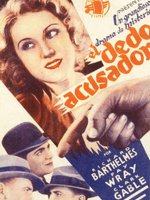 It can be fascinating to note the language in old pictures. Many of the usages are familiar, if musty, but occasionally one is surprised to hear a word or phrase one would have guessed was a more recent coinage.
It can be fascinating to note the language in old pictures. Many of the usages are familiar, if musty, but occasionally one is surprised to hear a word or phrase one would have guessed was a more recent coinage.
Take the term “joint,” as in the phrase, “A Spike Lee Joint.” Like us, you may have assumed that usage was fairly contemporary.
However, we came across it some months back in a 1932 picture, The Finger Points.
In the film, Richard Barthelmess portrays a serious, gentlemanly reporter from the South who’s new to the big city. He quickly makes his mark at the major daily at which he’s been hired by covering the gangster beat. Regis Toomey is the office cut-up. He’s a reporter, too, but he’s not terribly diligent or motivated. He even warns Barthelmess against sticking his neck by going after the mob too hard.
Fay Wray‘s a reporter for the same paper, and both men are sweet on her, natch. (Clark Gable‘s in the picture, too, but not in this scene.)
Barthelmess wins her heart, but Toomey keeps pitching and when Barthelmess disappoints Wray by becoming a little too close to the gangsters he’s covering (he appears to be on the take with them), she tells Toomey in a weak moment that if he’ll get serious about his career, if he’ll do some legitimate, hard-hitting reporting, she’ll reconsider his offer of marriage.
Toomey does just that, and when he rushes over to Wray’s apartment to show her the blockbuster, front-page story he’s written, he finds Barthelmess there. Barthelmess is sympathetic, but explains to Toomey that he and Wray are about to go away together, that they intend to be married.
“I’m sorry,” Barthelmess says. “I really am. She’s a great girl.”
“You telling me?” Toomey responds, despondent. “Here’s my story all over the front page — swellest joint I ever wrote! — and now it doesn’t mean a thing.”
We somehow like the idea of Spike Lee using classic lingo, a term that’s been around for decades, rather than recently coined slang (though we wonder if Lee was aware of the term’s history).
A friend of ours is the North American editor of the Oxford English Dictionary (one thing we really love about life in NYC is that we occasionally get to make the acquaintance of such prominent, accomplished, and knowledgable individuals as this friend). He’s very generous with his estimable knowledge and expertise, and we, in turn, very occasionally share these little “discoveries” of ours with him.
We definitely get the better end of that deal, but we feel quite proud when we do pass on a usage that’s considered “news,” as was the use of “joint” in The Finger Points. We’ve not heard the final verdict, but our pal said at the time that the appearance of the term “joint” in a 1932 picture “could be really important.”
Here’s hoping.
